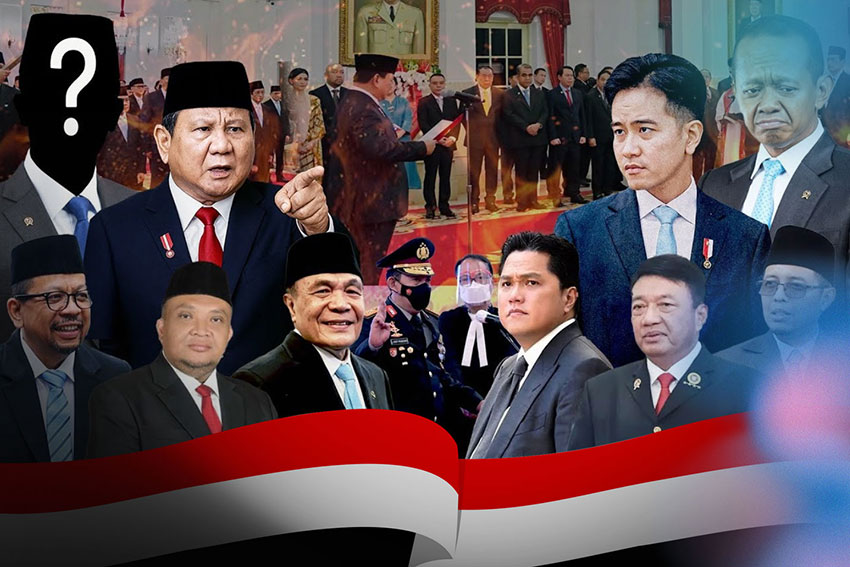Meritocracy and Politics in Governance Toward a Greater Indonesia

The Cabinet reshuffle held at the State Palace in Central Jakarta on Wednesday, October 8, 2025, marks the fourth reshuffle during the administration of President Prabowo Subianto. This Red-and-White Cabinet reshuffle represents a significant moment in Indonesia’s political dynamics, as it reflects a shift in policy direction, an evaluation of performance, and a strategy to strengthen the government’s legitimacy.
At the same time, the reshuffle should be understood as a test of how far meritocracy is truly being implemented within the state bureaucracy. Are appointments made based on competence, integrity, and track record, or merely to accommodate short-term political interests? Meritocracy demands that public offices be filled by individuals who can prove their excellence through performance and dedication — not simply by virtue of political proximity or electoral calculations.
We live in an archipelagic nation rich in natural resources and bound by cultural, linguistic, and historical diversity. Yet this wealth only holds meaning when managed by capable and principled hands. This is why meritocracy matters — and this is what the cabinet reshuffle tests: that national leadership must have the courage to select the best among its citizens and entrust them with the responsibility to lead and serve.
Politics without meritocracy is nothing more than a theatrical stage filled with accidental actors — eloquent in speech, yet frail in action. Governance without meritocracy is a rusting machine that moves sluggishly, burdened by nepotism and patronage. Thus, preserving the tradition of meritocracy during a reshuffle is akin to maintaining the lifeblood of government — keeping it clean, fresh, and strong.
Many nations have fallen not because of external enemies, but due to internal corruption; not from a lack of resources, but from the failure to build a just system. When left unguarded, meritocracy can quickly deteriorate into a new aristocracy — an elite class who believe they deserve to rule simply because they once prevailed in a selection process or possess access to education reserved for a privileged few.
For this reason, Indonesia must understand meritocracy not merely as an administrative mechanism but as a political philosophy — a philosophy that demands collective awareness: that public office is a trust, that the people’s confidence is a moral responsibility, and that power is a space to work for the common good, not for narrow interests.
Therefore, politics and meritocracy are inseparable, for politics is the arena of power distribution, while meritocracy is the measure of fairness in that distribution. When politics becomes a space of mere transactions, merit is discarded. But when politics dares to give room for the best to emerge, governance gains its moral legitimacy.
Meritocracy in Indonesia is not limited to bureaucratic recruitment or civil service selection. It must be understood as a cultural tradition. Good schools, fair universities, workplaces that reward achievement, and social communities that recognize individual effort — all are bricks that build the wall of meritocracy. Without cultural support, meritocracy will be unbalanced, remaining only as rhetoric in policy papers.
From this standpoint, it must be echoed that public office is not a political reward but a recognition of competence and dedication. Yet politics, with its endless tug of interests, can either strengthen or erode meritocracy. On one hand, politics provides direction — government has the authority to allocate budgets, design selection systems, and set performance standards.
On the other hand, politics can corrupt — short-term interests, party loyalty, or oligarchic pressure can sideline merit. Thus, strong governance is required: independent selection bodies, public transparency, accountability mechanisms, and organizational cultures that honor integrity.
History offers lessons. Modern China has upheld a bureaucratic examination system for millennia to ensure that administration is led by the educated. Singapore has made meritocracy its backbone, emphasizing rigorous selection and performance-based promotion.
Yet the dark side also teaches us: overly rigid meritocracy can breed elitism, creating a divide between the “successful” and the “left behind.” This is where Indonesia must learn — that the Indonesia Raya we aspire to is not merely a large nation on the map, but one that is strong in governance, fair in distribution, and noble in moral ideals. To achieve this, meritocracy must become an unshakable tradition.
A tradition that transcends regimes and temporary political interests — where anyone holding public office does so not because of family ties, not because of wealth, but because they are capable, deserving, and have fought for it. Governance built upon meritocracy will produce a resilient bureaucracy, rational policies, and a people who trust their nation.
Meritocracy is not an absolute guarantee of justice, but it is an irreplaceable foundation. Without merit, a nation sinks into favoritism, corruption, and mediocrity. With merit, Indonesia has the opportunity to move toward a clearer future — where every citizen feels they have space to strive, and every sincere effort earns recognition.
Thus, when we speak of Indonesia Raya, we speak of a nation that dares to reject shortcuts, nepotism, and favoritism — a nation that boldly declares that only the best shall lead. Indonesia Raya is an ideal that demands we keep the flame of meritocracy alive, even as political storms come and go.
In that flame shines the light of hope — that this nation can be great not by inheritance alone, but through collective, fair, and equal effort. Meritocracy, ultimately, is the long breath that strengthens the ideology of Pancasila, allowing Indonesia Raya to stand tall, gaze proudly at the world, and stride firmly toward a sovereign, just, and prosperous future.
Prof. Dr. Ermaya Suradinata, SH, MH, MS, served as Director General of Social and Political Affairs at the Ministry of Home Affairs of the Republic of Indonesia (1999–2001) and as Governor of the National Resilience Institute (LEMHANNAS RI) (2001–2005).
